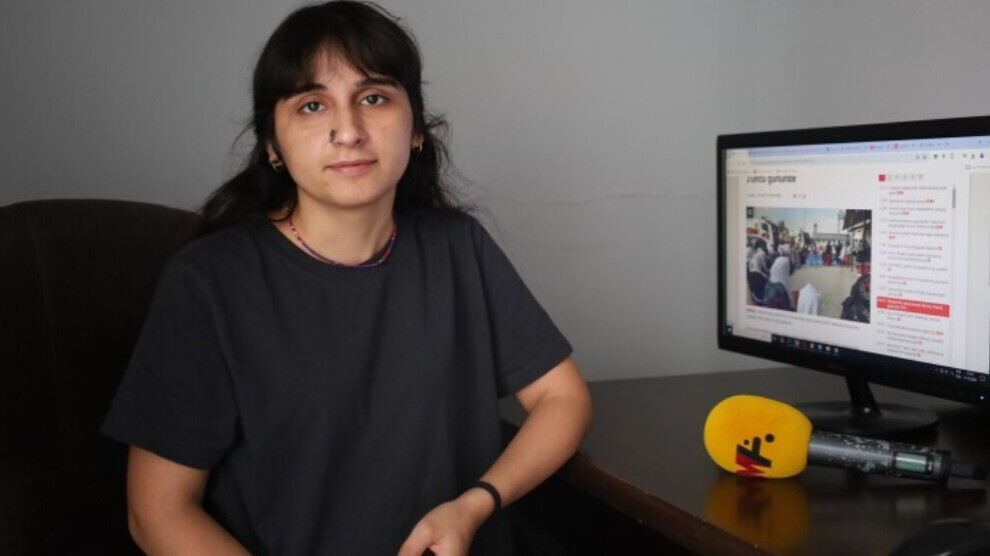Zeynep Durgut: We are threatened for exposing the truth
Journalist Zeynep Durgut said that those who uncover corruption and truth are constantly targeted and threatened in today’s anti-democratic climate.
Journalist Zeynep Durgut said that those who uncover corruption and truth are constantly targeted and threatened in today’s anti-democratic climate.

Journalists in Kurdistan are facing threats from criminal networks due to the news they report. In particular, members of the Free Press have increasingly become targets because of their investigative work. Zeynep Durgut, a reporter for Mezopotamya Agency (MA), was threatened by the family of Kenan Tatar, one of the defendants in the case of the “Prostitution Network” uncovered in the city of Şirnak (Şirnex).
Zeynep Durgut, a journalist threatened by the prostitution network, spoke to ANF about her experience. She said: “There is a legacy of truth that stretches from Apê Musa (Musa Anter) to Gurbetelli. For us, journalism is, at its core, a commitment to truth and a path guided by that principle. Journalism, for us, is a journey toward truth.
In social reality, truth is often met with anger. Because truth is frightening, unsettling, and illuminating. Journalists are either threatened, detained, or imprisoned. If you are a journalist in this country, you have to work with the constant awareness that something could happen to you at any moment.
Despite being in the right, we are not protected, we are treated as criminals and punished. Yet we believe in one thing: the only shield we have is truth itself, and our belief in that truth. Threats, violence, and even murders targeting journalists often go unpunished. Offenders are rarely prosecuted, or they walk free with very light sentences. This encourages further threats, especially where judicial independence is weak.
In countries where press freedom is restricted and freedom of expression is suppressed, threats against journalists rise. Because journalism functions as a mechanism of oversight, and authoritarian structures are disturbed by this. When media institutions are associated with specific political factions, journalists are no longer seen as independent voices but as spokespersons for one side. This perception legitimizes threats and attacks by certain individuals or groups.
The lack of strong solidarity among journalists, the weakness or neutralization of professional organizations, also leaves journalists more isolated and vulnerable.”
Judiciary remains silent when journalists are targeted
Zeynep Durgut noted that members of the Free Press are facing serious pressure and threats and shared the following observations: “In many countries, especially those ruled by authoritarian-leaning governments, the judiciary has fallen under the influence of the executive. This situation obstructs the implementation of a fair and impartial legal process in cases involving crimes against journalists. If the individuals or groups issuing threats are politically connected, the cases are often shelved or dismissed without prosecution.
When journalists are targeted, the legal system rarely reacts. But when journalists become the target of the judiciary due to a report they publish, the same mechanism is triggered instantly. This shows that the judiciary acts according to political interests. We can call this a dual-standard legal system.
Public pressure is a key factor in activating the judiciary. Yet in a deeply polarized society, threats against certain journalists can be legitimized by large segments of the public. The media may also remain silent, which further weakens the possibility of building pressure on the judiciary.”
We write the truth
Zeynep Durgut concluded by highlighting the importance of solidarity: “The most meaningful response we can give to the pressure, threats, detentions, arrests, and censorship targeting journalists is to produce more news, to uncover more truths, and to expose more wrongdoing. This is the path to resistance.
For a journalist, every place must become a space of struggle, and that is where the fight should begin. If you are persistent and determined in revealing the truth, then the truth will walk with you; those who stand for truth will stand with you.
Therefore, as journalists, we must remain in solidarity, both on and off the field. Solidarity makes us stronger.
Journalists must understand this: no one will protect us but ourselves. Because the profession we practice disturbs every segment of society, we write the truth. And for that reason, the form of struggle we build must be guided by even greater determination and resolve.”